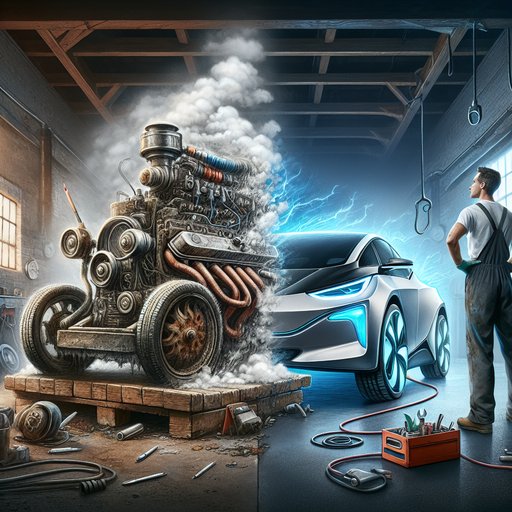 Echoing through the hallowed halls of automotive tradition, a seismic shift was underway. The once unquestioned reign of combustion engines was slowly giving way to the silent roar of electric powertrains. An old, wizened mechanic, often seen at the community garage, bore witness to this pivotal moment of change.
Echoing through the hallowed halls of automotive tradition, a seismic shift was underway. The once unquestioned reign of combustion engines was slowly giving way to the silent roar of electric powertrains. An old, wizened mechanic, often seen at the community garage, bore witness to this pivotal moment of change.
Ezra, a grizzled veteran in the world of motor engineering with years of grease under his fingernails, was a solid fixture at Old Man Fred's Garage. His days were usually spent under hooded car bonnets, his hands dancing over intricate combustion architectures. Each engine he encountered was a world in itself, telling tales of human ingenuity and our conquest of speed. Yet the familiar landscapes were slowly changing.
At first, it was the odd electric vehicle (EV) that rolled into the garage, an eccentric addition among the regular lineup of gas guzzlers. But as the years wore on, the electric surge became more noticeable. The quiet hum of electric motors gradually replaced the traditional roar of combustion engines. Ezra found his once busy hands idle more often, his stack of wrenches gathering dust.
He watched as eco-conscious clients enthusiastically espoused the virtues of their shiny new Teslas or Nissan Leafs, their eyes full of the promise of a greener tomorrow. But for him, these machines lacked a certain soul, a visceral connection forged in smoke, grease, and the roar of the engine. Surrounded by gleaming electric machines, he felt a strange sense of disconnect. Working on electric vehicles, the almost surgical precision required felt far removed from the grit and grime he fell in love with.
There was a coldness to it, a sterile efficiency that felt oddly impersonal. Recollections of late nights spent tweaking a carburetor till it hummed perfectly, or the satisfaction of coaxing more power from a simple block of metal offered a poignant counterpoint to this brave new world. These were experiences not simply written in service manuals, but penned in sweat, persistence, and an unending curiosity about the fiery beast under the hood. A silent and efficient electric vehicle could scarcely offer the same mysteries to unravel or challenges to overcome.
Italian physicist Enrico Fermi once remarked, 'Before I came here I was confused about this subject. After listening to your lecture, I am still confused — but at a higher level.' For Ezra, this perfectly captured his journey through this transformative era. He understood progress and admired the engineering brilliance involved, but something inexplicable made him pause and gaze nostalgically at the dwindling number of combustion engines. One evening, as another silent horizon signalled the end of the day, Ezra stared at his toolbox, now brimming with unfamiliar wiring schematics and battery management systems.
He wondered about his role in the impending future while languishing in memories of a past rapidly becoming distant. The dichotomy between his cherished mechanical world and the electronic realm before him was stark and beautifully human. He reluctantly accepted that the era of combustion engines was fading into the rear-view mirror. But as history itself often teaches us, every ending carries with it the genesis of a new beginning.
Soon, he just might find his place in this electric dawn after all.






















































